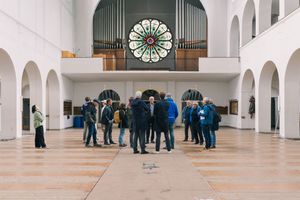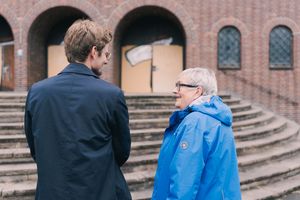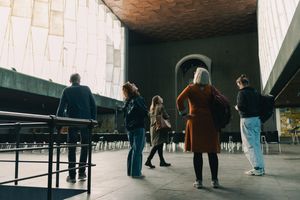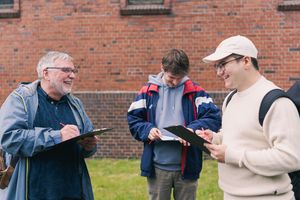- No news items yet
Insights from the Manifesta 16 Ruhr Citizen Consultations
As part of the pre-biennial process, Manifesta organises a series of workshops where local residents are invited to share their experiences and vision for their neighbourhoods. As Manifesta is invited by a Host Region, local input is a crucial part of the development of the biennial programme. This community-led approach aims to ensure that Manifesta 16 Ruhr reflects the needs and aspirations of those who live and work in the Ruhr area today. The sessions held throughout April and May across Gelsenkirchen, Essen, Duisburg and Bochum focused on the role and perception of cultural and social activities in and around former church buildings.
The multitude of opinions shared during the sessions made clear that there is no singular narrative reflective of the region. Yet some recurring themes emerged across various cities and communities.
Participants expressed a wide range of views on how former church buildings could be used. While some cherished quietness and privacy in their communities, others envisioned more dynamic transformations – from indoor playgrounds and botanical gardens to creative hubs and shelters. Many saw potential in making these buildings multifunctional, reflecting the diversity of needs and uses within a single community. Debate also arose around whether churches should remain public assets or be converted into private spaces, such as apartments or hotels.
Photo © Manifesta 16 Ruhr / Anton Vichrov





Fear of Demolition
As many of the church buildings throughout the Ruhr area face redundancy, a widespread concern among the workshop participants was the loss of these impressive architectural landmarks, along with their social function. Many expressed that the worst outcome for their neighbourhoods would be if these church buildings were left empty, fell into disrepair or were demolished. Participants widely agreed that the abandoned buildings should be used and repurposed.
Desire for Lasting Impact
Regarding the arrival of Manifesta in the Ruhr area, a common sentiment was the hope that the biennial would not be a fleeting cultural event that “catapults into” the region and quickly disappears, leaving the place unchanged. Instead, participants expressed a desire for enduring change, reflecting the need for long-term investment in the cultural and social fabric of the Ruhr area.
Perhaps the most powerful reflection came from a participant who reminded us that: “The real beacons are not the churches, but the people who make a difference in the neighbourhood.”
We want to express our heartfelt gratitude to everyone who joined a Citizen Consultation session over the past months. Your insights directly inform the foundation of the Manifesta 16 Ruhr programme, which will unfold in the summer of 2026. If you’d like to join us for the upcoming Citizen Consultations that will be held this summer, keep an eye on our social media channels and newsletter.
Photo © Manifesta 16 Ruhr / Anton Vichrov